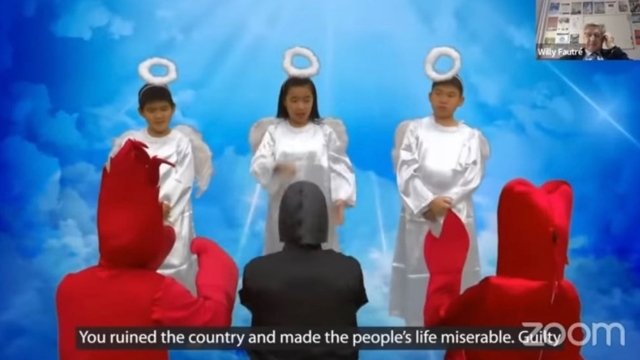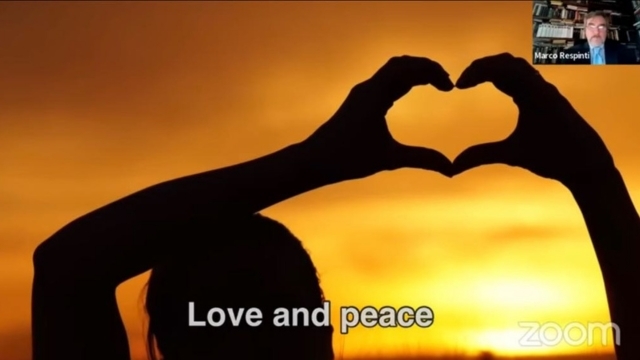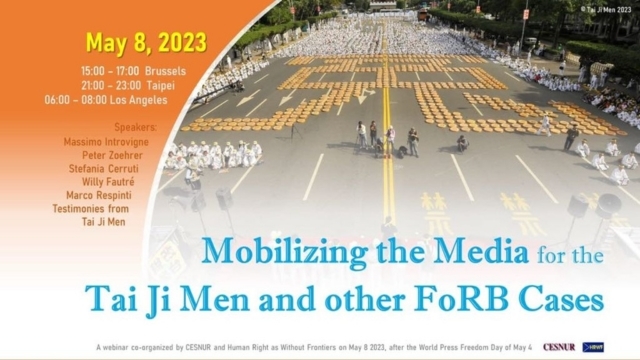After Word Press Freedom Day, journalists and other experts discussed in a webinar the shortcomings of media coverage of religious liberty issues, including in the case of Tai Ji Men.
by Daniela Bovolenta

On May 8, 2023, after the United Nations World Press Freedom Day of May 4, CESNUR and the Brussels-based NGO Human Rights Without Frontiers organized one of their bi-monthly webinars on the Tai Ji Men case and freedom of religion or belief (FoRB). The title was “Mobilizing the Media for the Tai Ji Men and Other FoRB Cases.”
Massimo Introvigne, an Italian sociologist who serves as managing director of CESNUR and editor-in-chief of “Bitter Winter,” introduced the webinar by commemorating the figure of the Polish Franciscan Catholic priest Maximilian Maria Kolbe, who was killed by the Nazis at Auschwitz in 1941. Novels and movies remember Kolbe for his heroic death. He volunteered to be killed in the place of a Polish military man who had a wife and children, and who survived Auschwitz, dying in 1995 at age 93.
Kolbe’s extraordinary death has obfuscated the reason he was detained in Auschwitz in the first place. This happened because he was an immensely popular journalist, who dared to criticize the Nazi regime and its crimes. He was, thus, a hero and a martyr of the freedom of the press, in stark contrast with those journalists who accepted to propagate the Nazi lies to save their lives. While no blood was shed in the Tai Ji Men case, Introvigne concluded, media slander caused considerable pain to the dizi (disciples). Just as it happened in Nazi times, some journalists prostituted the dignity of their profession by accepting to propagate the slander against Tai Ji Men created by the prosecutor who had started the case.
Introvigne then presented a video with the performance of a Tai Ji Men dizi, Robin Liang, at the May 4-5 annual ISFORB (Institute for the Study of Freedom of Religion or Belief) conference at the Evangelical Theological Institute (ETF) of Leuven, Belgium. Liang, who also spoke at the conference together with another dizi, Judith Chiu, and presented the Tai Ji Men case, offered to the participants a taste of the classic Taiwanese opera and told at the same time the story of the injustice vested on their spiritual movement.

Introvigne introduced the first two speakers, Peter Zoehrer, an Austrian journalist and blogger who serves as Executive Director of FOREF (Forum for Religious Freedom – Europe) and Stefania Cerruti, external relations manager for the Major Emergencies and Disasters International School (MEDIS).
Zoehrer explained that freedom of the press and freedom of religion or belief are two sides of the same coin. Both protect essential human rights and statistics show that, in countries where freedom of religion or belief is denied, there is also no free press. Zoehrer offered several examples of this sad state of affairs, from Afghanistan to the Central African Republic. He also noted that, despite what would seem as a natural alliance between a free press and religious believers, the latter today often see the media as potential enemies. This happens because the media are easily manipulated by politicians and bureaucrats who often spread lies about religion and religious minorities. This also happened with the slander created against Tai Ji Men and relayed irresponsibly by the media. However, Zoehrer noted the recent emergence of some specialized media, including “Bitter Winter” and “The European Times” defending the cause of freedom of religion or belief, and also reported that a recent visit of scholars and human rights activists to “The Taipei Times” resulted in some good references to the Tai Ji Men case.
Cerruti, a specialist of major disasters, explained that the role of the media is crucial when natural disasters hit. Irresponsible coverage can result in an increased loss of human lives. She gave the example of the fake news of sharks swimming on American highways and urban avenues after hurricanes. While these news were originally created for entertainment, after the war in Ukraine they are being massively relayed by Russian propaganda and social media trolls to criticize the American authorities and create panic and distrust. Cerruti said that violations of human rights and freedom of religion or belief also create human-made disasters, of which the Tai Ji Men case is an example. Here, again, media that spread slander and false accusations against Tai Ji Men made the suffering of the dizi worse, while good and responsible media should have told the truth, criticized the mistakes of the authorities, and made the solution of the case easier.
The full video of the webinar.
Introvigne then passed the podium for the second session to Willy Fautré, co-founded and director of Human Rights Without Frontiers. Fautré presented the video “The Court of Heaven,” where children tell the story of three evil judges, who acted unjustly in tax cases. They are examined in the afterlife and punished by turning them respectively into a lobster, a crab, and a dinosaur. They try to repent, but it is too late, although if their repentance is genuine they may always have a chance.

Fautré noted that media may be friends of freedom of religion or belief, but may also become its enemies when they became subservient to politicians and bureaucrats who discriminate against religious minorities. Fautré criticized the use of derogatory terms such as “cults” to stigmatize some unpopular religious minorities, and quoted several incidents in which this slander created actual physical violence.
Fautré then presented the testimonies of five dizi. Ellena Ma, who has herself a substantial experience in the media field, reported how as a professional she was shocked when she saw how quickly detailed articles against Tai Ji Men were published only a few hours after the December 19, 1996, raid that started the case. Her impression was that the articles had already been prepared beforehand. This was reminiscent, she said, of how the regime manipulated both the media and the ordinary life of citizens during the Martial Law period in Taiwan. This is something Ma was reminded of when she was with foreign scholars and human rights activists in April to visit the National Human Rights Museum, located in a former military compound in Taipei where during the White Terror period opponents of the military regime were detained and tortured.

Allen Yeh, a patent engineer, reported how he participated in 2022 in a program discussing the seizure of Tai Ji Men property that happened two years before, in 2020, based on an ill-founded tax bill. Yeh explained that in 2020 the authorities used the same strategy as in 1996, disseminating slanderous articles against Tai Ji Men in both printed and electronic media. Yeh emphasized the need for objective and genuine journalism that would report the facts correctly rather than acting as the mere mouthpiece of the authorities.
Judy Lo, a product manager for a technology company with academic degrees in psychology, discussed the psychological impact of false and partisan news, and quoted studies demonstrating that exposure to aggressive political reporting increase the levels of stress and anxiety among those who follow such news. Experiments have proved that fake news may also create economic behavior, such as the rush to purchase certain products after it was falsely announced that they might soon disappear from the supermarkets’ shelves. The Tai Ji Men case, Lo argued, was another incident in which artificially produced false news created in the public opinion an attitude that condoned the persecution.

John Luo, who works as an executive in the textile industry and has supervised textile projects both in Taiwan and Vietnam, reported that problems with the media exist also in his field. Issues of sexual harassment of female workers, the (illegal) use of minors in the productive chain of textile, overtime work in certain factories do exist in an otherwise dynamic industry. Media alternatively sensationalize or downplay them, thus making problems worse. On the other hand, media that accompany in a critical but constructive way the growth of textile industry in Taiwan and Vietnam play a positive role, This should be true also for freedom of religion or belief and the Tai Ji Men case, Luo said. Unfortunately, coverage of the case by Taiwanese media has often been inadequate or has simply repeated the arguments of the prosecutor and the tax bureaucrats. However, Luo concluded, “Bitter Winter” and other international media have now started offering a fair coverage of the Tai Ji Men case, which would hopefully help achieving its solution.
Bobby Chen is a Canadian storyboard artist, who translates details of life into visual stories. He appreciates the effort to protect freedom of the press in Canada, including by separating the public Canadian Broadcasting Corporation (CBC) from the government, thus favoring its independence. Coming back to Taiwan, however, Chen has been compelled to notice that most media are less independent there. Particularly when it comes to tax issues, they tend to accept uncritically the version of the authorities, which happened both in the Tai Ji Men and other cases. Correcting this state of affairs, Chen said, is a monumental task, but results can be achieved through the international cooperation we increasingly see at work around the Tai Ji Men case.
Marco Respinti, an Italian journalist and scholar who serves as director-in-charge of “Bitter Winter,” offered the conclusions of the webinar. He started from “The Book of Eli,” a 2010 Hollywood movie directed by the Hughes Brothers, where in an apocalyptic and half-destroyed Planet Earth a believer struggles to save the last copy of the Bible while an evil warlord tries to steal it. The latter wants the Bible not because he understands its religious meaning, but because he knows it includes powerful words of truth that, once spoken, would persuade and arouse the enthusiasm of many. The lesson of the movie is that words are powerful, including the words printed or spoken by the media. Respinti said this is also true for the Tai Ji Men case. Media that subserviently repeat the lies of corrupt bureaucrats make solving the Tai Ji Men case impossible. On the other hand, media willing to speak words of truth about it may really favor a solution of the case.

The event concluded with a video featuring the trademark Tai Ji Men song “Love of the World,” which represents the hope for a better world where peace, love, and all human rights can flourish.
Source: Bitter Winter

